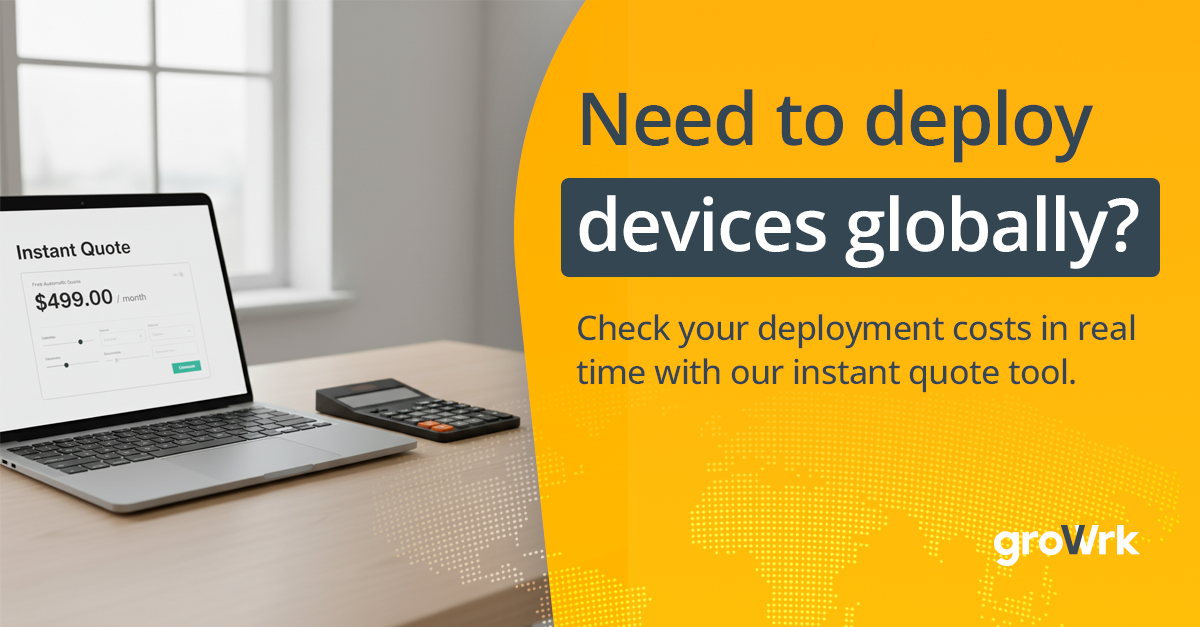How to send IT equipment to Thailand
Are you looking to send IT equipment to remote teams in Thailand? At GroWrk, we specialize in simplifying cross-border IT asset management, ensuring seamless delivery of laptops, servers, and other essential devices to Thailand. From logistics to customs clearance and regulatory compliance, we handle everything so you can focus on business growth.
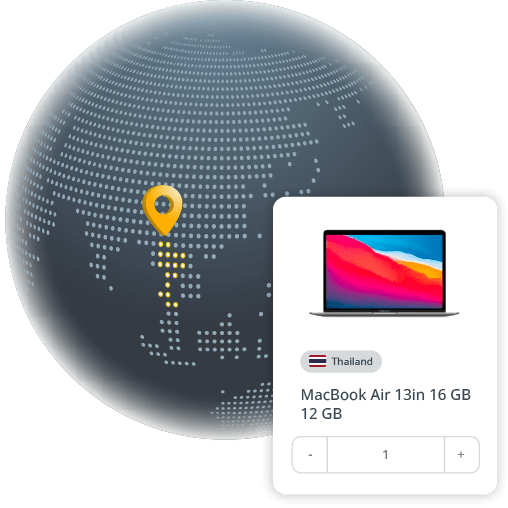
At a glance
Thailand is emerging as a vibrant digital economy, known for its strategic location in Southeast Asia, robust infrastructure, and government-driven initiatives to drive technological innovation. The country's commitment to digital transformation makes it an attractive destination for businesses looking to expand their operations and adopt new technologies.
|
CURRENCY Thai Baht (THB) |
OFFICIAL LANGUAGE Thai English is widely used in business. |
TIME ZONE GMT +07:00 Indochina Time (ICT) |
|
CUSTOMS DUTY ON ELECTRONICS 0% Value Added Tax (VAT) of 7% applies |
SHIPPING LEAD TIME 3–7 days (depending on shipping method and customs clearance) |
IT OUTSOURCING MARKET Thailand’s IT outsourcing market is growing steadily, with increasing demand for cloud services, IT consulting, and software development. The average spending per employee in the IT outsourcing market is projected to reach US$26.43 by 2025. |
Overview of IT operations in Thailand

Driving digital transformation: The Thai government has taken significant steps to accelerate digital transformation across the nation. Initiatives such as the "Thailand 4.0" economic model and the Smart City projects have fostered the development and adoption of emerging technologies, particularly in areas like fintech, artificial intelligence, and automation. By encouraging collaboration between the government, private enterprises, and educational institutions, Thailand is building a dynamic ecosystem that promotes innovation and the rapid evolution of key industries.
Advanced IT infrastructure: Thailand boasts a solid IT infrastructure, with excellent broadband connectivity, expanding 5G networks, and increasing investments in data centers. This infrastructure is crucial in supporting the digitalization of industries and facilitating the growth of tech startups. The government’s strategic focus on scaling up the digital landscape makes Thailand an appealing destination for multinational corporations and technology companies looking to tap into Southeast Asia’s growing market.
Commitment to sustainability: Sustainability plays a significant role in Thailand’s digital strategy. The government has been pushing for greener technologies, including energy-efficient IT practices and sustainable data centers, as part of the country’s broader environmental goals. Thailand is aligning its digital and sustainability efforts with global environmental, social, and governance (ESG) standards, making it an ideal place for companies focused on both digital innovation and environmental responsibility.
Skilled and future-ready workforce: Thailand’s workforce is known for its strong technical capabilities and adaptability. The country continues to invest heavily in digital skill development through initiatives aimed at fostering expertise in key fields such as artificial intelligence, cybersecurity, and cloud computing. With programs such as the Digital Skill Development Program, Thailand is ensuring a steady pipeline of talent to meet the demands of a rapidly evolving digital economy.
Pro-business environment: Thailand offers a stable and business-friendly environment, characterized by attractive tax incentives, investment opportunities, and a solid intellectual property protection framework. The country’s business ecosystem encourages digital trade and fosters innovation, making it a strategic location for companies looking to scale and expand operations across Southeast Asia and beyond.
Robust cybersecurity and data protection: Thailand has strengthened its legal frameworks surrounding cybersecurity and data protection. The Personal Data Protection Act (PDPA) and various cybersecurity regulations provide businesses with a secure environment for digital operations. These laws ensure that sensitive data is handled with the highest level of protection, making Thailand a reliable and secure destination for businesses operating in the digital space.
Thriving tech ecosystem: Thailand’s tech ecosystem is flourishing with innovation hubs and startup incubators spread across the country, particularly in Bangkok. With growing support from the government and private sector, the nation is rapidly becoming a tech hub, attracting both local and international startups, R&D-driven companies, and investors. Thailand’s open market and business infrastructure make it an ideal place for tech enterprises to establish themselves and expand regionally.
Shipping IT equipment to Thailand: What you need to know
| Customs regulations |
|
| Duties and taxes |
|
| Required documentation |
|
| Customs clearance process |
|
| New vs. Used equipment |
|
| Penalties or fines for non-compliance |
|
Checklist for sending laptops to Thailand
When shipping laptops to Thailand, it’s important to follow a few best practices to ensure the process goes smoothly, and your equipment arrives safely and on time. Here are some helpful shipping tips:
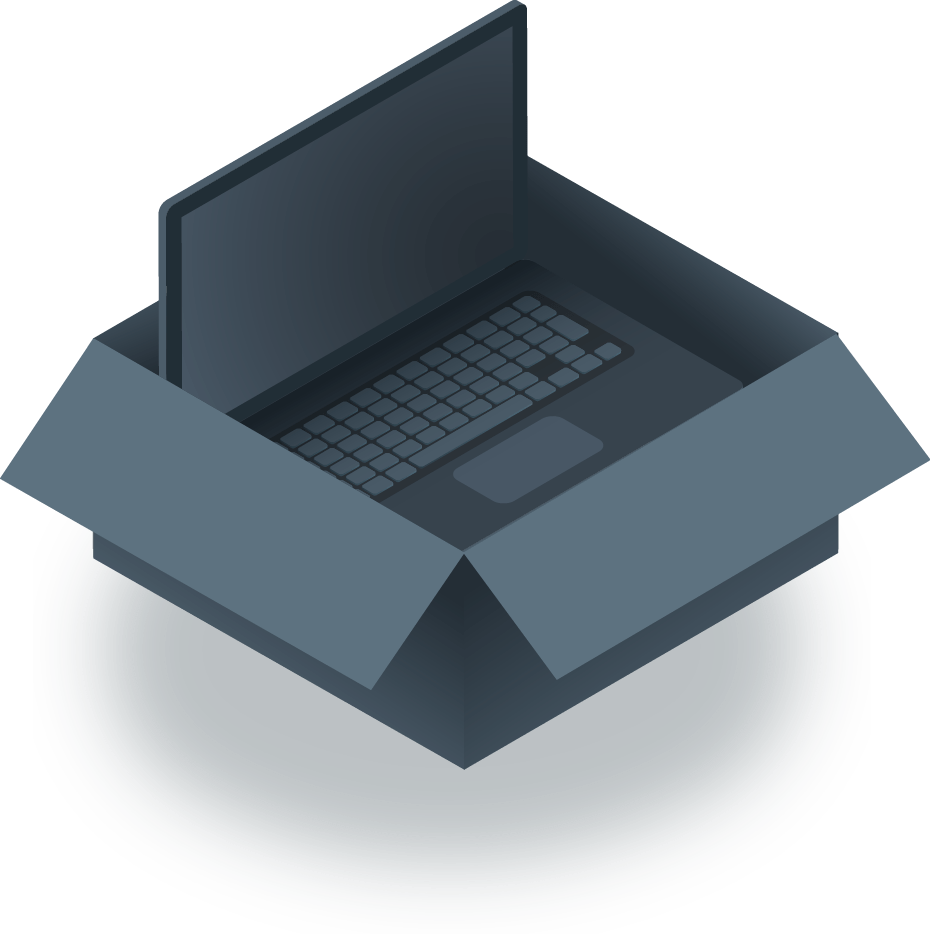
Select trusted couriers: Choose established couriers such as GroWrk, DHL, UPS, FedEx, or Thailand Post. These providers offer end-to-end tracking and are well-versed in Thai customs regulations, ensuring smoother processing and delivery.
Check service levels: Select the appropriate shipping option based on urgency. Express shipping (3-7 days) for high-priority deliveries. Standard shipping (7-14 days) for cost-effective options.
Use high-quality packaging: Secure laptops with sturdy, padded boxes and protective materials like bubble wrap, foam inserts, or air cushions to prevent damage during transit.
Disassemble where possible: If shipping accessories like chargers, docking stations, or monitors, package them separately to prevent damage. Remove detachable components if applicable.
Label clearly: Ensure the recipient’s name, address, and contact details are correctly labeled. Mark the package as "fragile" to encourage careful handling.
Accurate product descriptions: On the commercial invoice, provide a detailed and accurate description of the laptop, including its brand, model, and serial number. Inaccurate descriptions may cause customs delays.
Value declaration: Declare the correct value of the laptop to avoid under- or over-declaring, which could lead to customs inspections or fines. The declared value determines any applicable duties and taxes.
Customs declarations: All shipments to Thailand require proper documentation, including a commercial invoice, packing list, and air waybill. For individual recipients, a copy of the Thai National ID may be required. For businesses, a VAT number or import license might be needed depending on the shipment size and purpose.
Proof of origin: If applicable, include a certificate of origin to benefit from tariff reductions under trade agreements such as ASEAN or JTEPA. This helps reduce processing time and tax liabilities.
Understand import duties & taxes: Laptops are exempt from import duties in Thailand. However, they are subject to 7% VAT, calculated based on the CIF value. Customs may also charge a 0.4% processing fee. Used laptops can trigger additional scrutiny and documentation.
Pre-pay duties and taxes: Some couriers allow for pre-paid duties and taxes to simplify customs clearance and prevent the recipient from facing unexpected charges upon arrival.
Protect against loss or damage: Consider purchasing shipping insurance for high-value laptops to protect against loss, theft, or damage during transit.
Compliance with Thai regulations: If the laptops include wireless or cellular functionality and are being imported commercially, they may need to comply with NBTC regulations. Devices shipped for personal use are typically exempt from this requirement.
Use tracking tools: Major couriers provide real-time tracking—monitor shipments closely to anticipate customs clearance updates and delivery progress.
Stay in touch with the recipient: Notify the recipient about the expected delivery timeline, tracking updates, and any customs-related requirements to avoid delays.
Expect weather and seasonal delays: The monsoon season (May to October) and holidays like Songkran or year-end events may cause slight delays. Plan accordingly if shipping during these periods.
Thai domestic delivery options: For final delivery, local providers like Thailand Post, Kerry Express, Flash Express, or SCG Express offer fast and reliable options to complete the shipment efficiently.
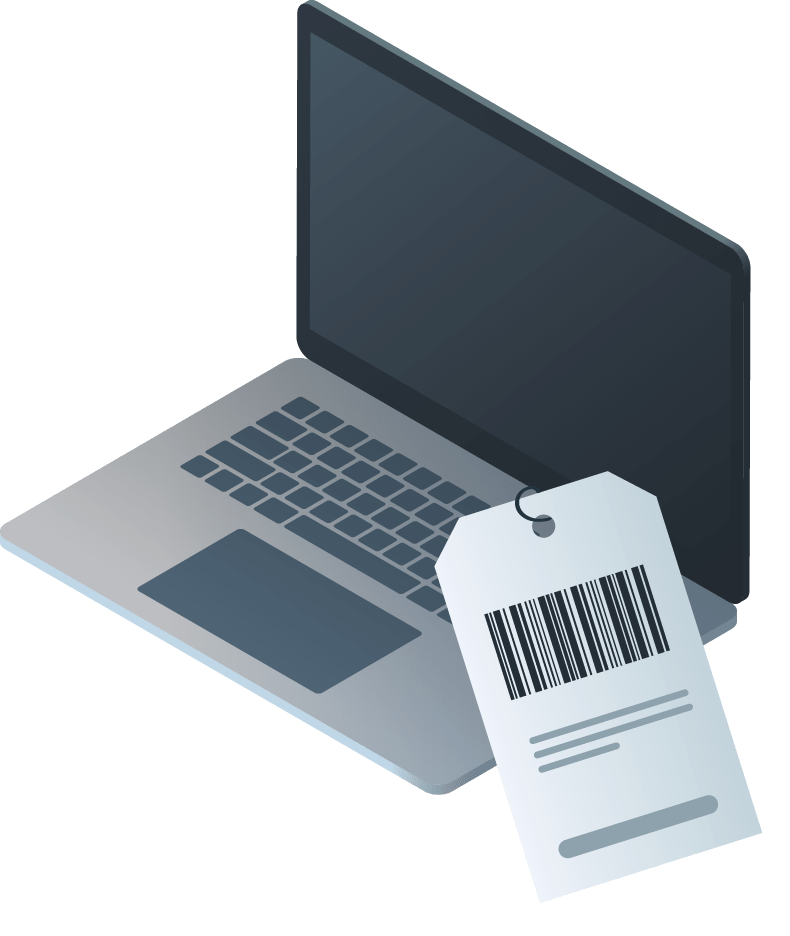
Average cost of IT Equipment in Thailand
Laptops (Business Grade):
- Mid-range: $560 – $1,260 USD
- High-end: $1,260 – $3,920+ USD
High-end models such as Apple MacBook Pro, Dell XPS, and Lenovo ThinkPad are priced on the higher end.
Monitors (Business Grade):
- Standard: $250 – $700 USD
- Ultrawide/4K: $700 – $1,540+ USD
Monitors from trusted brands like Dell, Samsung, and LG typically range within these prices, with 4K or ultrawide models costing more.
Desktops (Business Grade):
- Standard Desktop PC: $390 – $1,540 USD
- Workstation Desktop (for high-performance tasks): $1,540 – $5,040+ USD
Prices depend on the brand and specifications, with options from HP, Lenovo, and Apple among the most common.
Printers (Laser):
- Standard Office Printers: $140 – $560 USD
- High-Volume Printers: $700 – $2,800+ USD
Leading brands such as HP, Canon, and Brother offer a wide range of models for office environments.
Public holidays & IT work hours to plan your shipment
Key public holidays in Thailand:
- New Year’s Day – January 1
- Makha Bucha Day – Date varies (usually February or March)
Chakri Memorial Day – April 6 - Songkran Festival (Thai New Year) – April 13–15 (can extend depending on the region)
- Labour Day – May 1
- Coronation Day – May 4
- Visakha Bucha Day – Date varies (usually May or June)
- Asalha Bucha Day – Date varies (usually July)
- King Maha Vajiralongkorn’s Birthday – July 28
- Queen Sirikit’s Birthday/Mother’s Day – August 12
- King Bhumibol Memorial Day – October 13
- Chulalongkorn Day – October 23
- King Bhumibol’s Birthday/Father’s Day – December 5
- Constitution Day – December 10
- Christmas Day – December 25 (Observed by some international businesses)
- New Year’s Eve – December 31
Typical work hours for IT professionals
- Standard week: Most IT pros work Mon–Fri, 9 AM–6 PM (40–48 hrs/week). Startups and multinationals often offer flexible hours.
- Remote work: Hybrid/remote setups are common, especially in software, cloud, and security roles. Boosted by strong digital infrastructure.
- Overtime pay: OT = 1.5x pay; public holidays = 2x or day off. Managers often excluded—compensated via salary or flex leave.
- Public holidays: Most IT firms close, but essential staff may work. Must get 2x pay or time off in lieu.
What to consider when retrieving IT equipment from employees in Thailand
| Local delivery and logistics services |
|
| Inventory management |
|
| Logistics challenges for remote locations |
|
| Equipment agreement with employees |
|
How to dispose of IT equipment in Thailand
E-Waste Recycling:
- Certified e-waste handlers: Ensure responsible disposal of equipment by using registered recyclers who follow environmental regulations and proper e-waste management practices.
- Drop-off recycling centers: Take advantage of designated e-waste recycling centers where old IT equipment can be responsibly disposed of, ensuring compliance with environmental regulations and reducing landfill waste.
Data Destruction:
- Wipe data completely: Use certified software to ensure all sensitive data is permanently erased, preventing unauthorized access and data breaches.
- Physical destruction: Physically destroying hard drives through shredding or degaussing ensures that no data can be recovered, making it a highly secure method of disposal for sensitive information.
Repurposing or Donating:
- Support education & communities: Donate working computers to schools, non-profits, or community programs in Thailand. Many educational institutions and social organizations benefit from donated IT equipment, helping bridge the digital divide and providing access to technology for underprivileged students and communities.
- Internal reuse: Older devices can be reassigned for secondary tasks before disposal. Companies can repurpose IT equipment for less demanding roles, such as training, testing, or administrative functions, extending the lifecycle of devices and reducing e-waste.
Manufacturer Recycling Programs
- Brands like Dell, HP, and Apple offer take-back programs for safe recycling or refurbishment. These programs ensure that old or used IT equipment does not end up in landfills, helping to reduce environmental impact. Many manufacturers provide incentives, such as discounts on new devices, for customers who return old equipment for proper disposal.
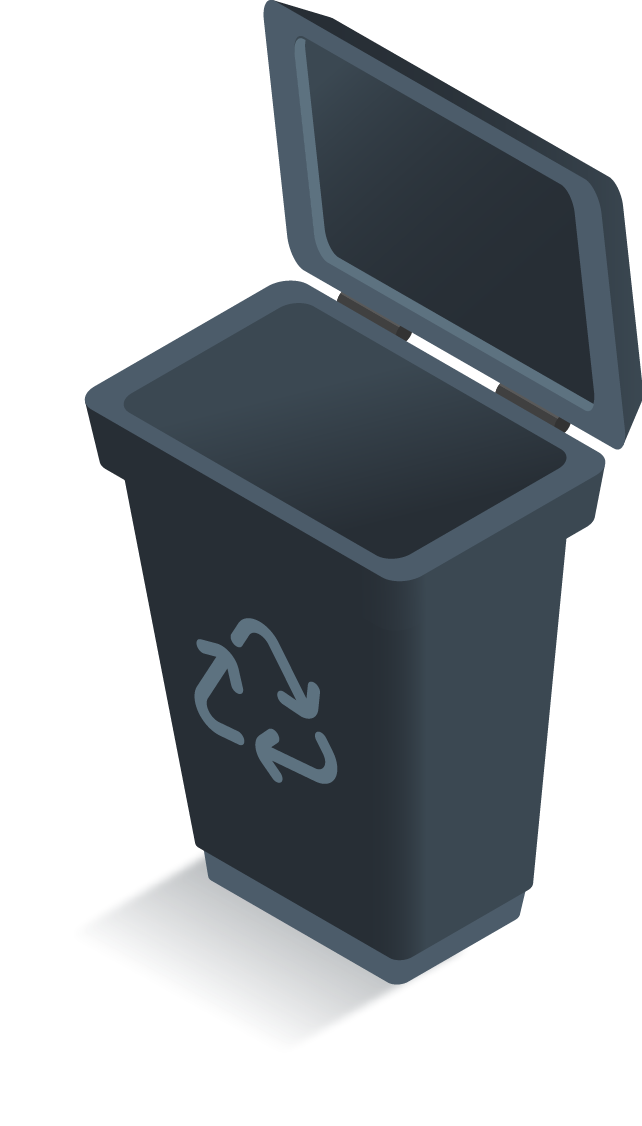
Local IT Outsourcing Solutions in Thailand
You can streamline your IT logistics and asset management with GroWrk’s comprehensive global solution. Whether it’s shipping equipment or managing IT assets across multiple regions, GroWrk helps you stay compliant and efficient, every step of the way. Here’s why GroWrk is the ideal partner for managing your IT assets in Thailand:

| 1. Wide global coverage |
We bring a global perspective to IT services while deeply understanding Thailand’s legal, regulatory, and business landscape. This combination ensures that our solutions are fully compliant with local labor laws and data privacy standards, enabling businesses to operate with confidence and accuracy in the Thai market. |
| 2. End-to-end asset management |
From sourcing to retirement, we oversee the full lifecycle of your IT equipment. Our holistic approach means we handle everything—device procurement, configuration, delivery, collection, and environmentally responsible disposal—so your team can stay focused on mission-critical tasks. |
| 3. Intuitive platform for easy deployment |
GroWrk’s advanced asset management system offers real-time visibility and centralized oversight of your IT inventory across Thailand. This streamlined approach reduces logistical complexity and helps keep your workforce aligned and equipped, regardless of whether they’re in Bangkok, Chiang Mai, or remote locations. |
| 4. Smooth delivery and equipment retrieval |
We ensure that IT devices reach employees quickly and securely wherever they’re based. When devices need to be returned, due to offboarding or upgrades, we manage the retrieval process efficiently to avoid loss and maintain operational continuity. |
| 5. Compliance with Thai import regulations |
We take care of all the regulatory requirements involved in shipping IT equipment to Thailand. From navigating import duties and VAT to handling documentation for customs clearance, we ensure everything moves smoothly through the system without delays or legal issues. |
| 6. Efficient repairs and maintenance |
Our responsive maintenance services ensure your devices stay functional and up to date. We address hardware or software issues promptly to reduce downtime, allowing your business to operate without disruption. |
| 7. 24/7 Support for peace of mind |
Our support team is available 24/7 to answer questions or resolve issues related to asset tracking, logistics, or device performance. Whether it's day or night, we're here to keep your IT operations running seamlessly across Thailand. |
Procure, configure, and deploy your IT devices from one platform


